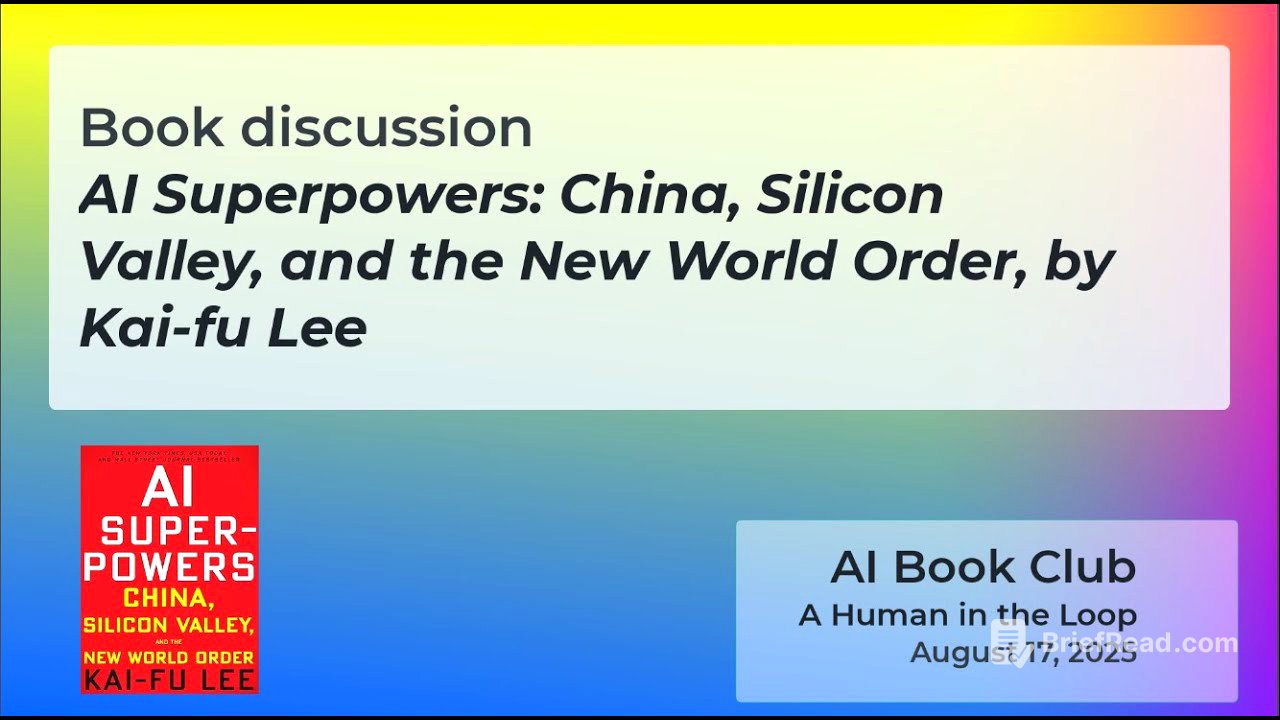TLDR;
This AI Book Club discussion, recorded on August 17, 2025, centers on Kaifu Lee's "AI Superpowers," exploring its relevance to current events, particularly regarding China's role in AI. Participants share initial reactions, discuss China's competitive dominance, and debate the potential social and political impacts of AI advancements. The conversation also covers the future of work, the role of technical writers in an AI-driven world, and the complexities of US-China relations in the AI landscape.
- The book "AI Superpowers" is surprisingly relevant, especially regarding China's advancements in AI.
- China's competitive dominance in AI is a significant concern, with potential political and cultural implications.
- The future of work is uncertain, with discussions around potential job displacement and the need for social safety nets.
- Technical writers may need to evolve into AI managers, focusing on expertise and quality control.
- US-China relations in AI are complex, with debates around chip sales and maintaining leverage.
Introduction [0:01]
Tom Johnson introduces the AI Book Club and its focus on discussing books relevant to current AI trends. The club aims to provide a platform for individuals from various backgrounds to explore AI-related topics and share their perspectives. The current discussion revolves around Kaifu Lee's book, "AI Superpowers: China, Silicon Valley, and the New World Order," published in 2018, which remains surprisingly relevant, especially concerning China's advancements in AI.
General Reactions to the Book [2:31]
Participants share their initial reactions to "AI Superpowers," noting its eye-opening insights into China's AI landscape. They discuss the competitive tactics of Chinese businesses and the duopoly forming between China and the US in the AI race. The book's forecasts are examined for their accuracy in 2025, with a consensus that they have held up well.
China's Competitive Dominance [6:23]
The discussion highlights China's extreme competitive dominance in AI and related fields. Recent articles are cited, showcasing China's advancements in biotech, electric vehicles, and energy sectors. Participants express concern about the potential implications if China wins the AI race, including the impact on democratic institutions.
Social Investment Stipend [16:20]
The book club members explore the author's proposal of a social investment stipend as a solution to potential job displacement caused by AI. While some appreciate the idea of incentivizing community engagement and supporting each other, concerns are raised about the practical execution and potential for dystopian outcomes. The discussion touches on the challenges of transforming societal values and the role of government intervention.
Impact of AI on Employment [22:36]
The potential for massive unemployment due to AI advancements is a central theme. Participants debate whether the predicted 40-50% unemployment rate by 2030-2035 is realistic. The conversation explores the idea that while entire jobs may not be automated, tasks within jobs will be, leading to disruption and the need for adaptation.
The Role of Technical Writers in the Age of AI [31:56]
The discussion shifts to the future of technical writing in an AI-driven world. Participants explore how technical writers can evolve their roles to remain relevant, focusing on areas where AI is weak, such as social-emotional connection and expertise. The idea of technical writers becoming managers of AI outputs, ensuring accuracy and plugging knowledge gaps, is discussed.
US-China Relations and AI Strategy [45:41]
The book club members analyze current events related to China, particularly the Nvidia deal where the government receives 15% of chip sales. The discussion explores the complexities of US-China relations in the AI landscape, including the balance between economic benefits and competitive risks. The potential long-term implications of cultural and political tensions are also considered.
Chinese Company Mentality [53:09]
The group examines the Chinese company mentality described in the book, characterized by a gladiator-like approach and a focus on profit. Participants question why this mentality hasn't led to the outsourcing of tech writing jobs to China, potentially disrupting the industry. The discussion touches on the limitations of AI in replacing human expertise and the importance of change management in organizations.
Change Management and AI Adoption [55:30]
The importance of change management in AI adoption is emphasized, with a focus on human-centric and values-aligned approaches. Participants discuss the challenges organizations face in adapting to AI, including biases and resistance to change. The conversation highlights the potential for lag in AI adoption and the need for careful assessment of AI outputs.
Conclusion and Next Book [59:15]
Tom concludes the discussion, thanking participants for their insights. He announces the next book for the club, "Empire of AI" by Karen How, which offers a more critical perspective on AI's impact. The recording of the book club will be shared online, and participants express their appreciation for the conversation.









